Lifelines of Connectivity: How Wireless Telecoms Are Powering Modern UK Healthcare
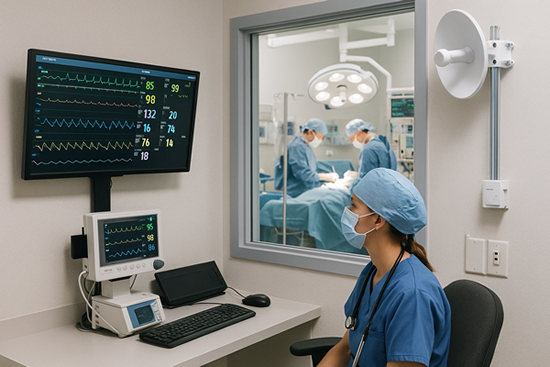
From remote clinics to inner-city hospitals, the UK’s healthcare system is evolving rapidly and reliable, secure wireless connectivity is now as essential as the clinical equipment used inside. At Rapid Wireless, we provide specialist wireless telecommunications solutions that enable NHS Trusts, private healthcare providers, care homes and emergency services to operate with confidence, clarity and speed. Healthcare’s Growing Demand for Wireless Connectivity Healthcare is increasingly dependent on digital systems, whether it’s for real-time patient monitoring, medical imaging transfers, electronic health records, or mobile diagnostics. Yet these systems are only as effective as the networks that support them. Modern healthcare environments require: Without a robust telecommunications backbone, everything from critical care to outpatient services can be compromised. Our Wireless Telecom Solutions for Healthcare At Rapid Wireless, we design and deliver wireless infrastructure tailored to healthcare needs, including: Private 5G Networks: Dedicated wireless networks that ensure fast, secure communications across hospital estates and field units, with no reliance on public cellular infrastructure. Wi-Fi Backhaul & Access Point Integration: Ensuring seamless connectivity for hospital staff, visitors, and connected devices across wards, operating theatres, and outdoor areas. Point-to-Point Microwave Links: High-bandwidth, low-latency connections between hospital campuses, data centres, or remote clinics, especially useful where fibre isn’t feasible. Temporary Connectivity Solutions: Deployable comms for pop-up testing sites, vaccination hubs, or mobile clinics – perfect for public health emergencies. Resilient Infrastructure for Emergency Services: Support for ambulance networks, patient transfer units and command centres with high-reliability wireless coverage. Why Wireless Matters in Healthcare Wireless telecommunications play a crucial role in improving patient outcomes by enabling real-time data transmission, so clinicians can make faster and more informed decisions at the point of care. They also enhance operational efficiency, as wireless mobility supports quicker patient admissions, more effective diagnostics and smoother coordination across departments. In times of crisis, such as cyberattacks or natural disasters, a resilient wireless network ensures that critical healthcare services remain functional and accessible. As healthcare facilities evolve into smart hospitals, wireless infrastructure becomes essential to support connected medical devices, IoT systems and AI-powered diagnostics. Speak to us… If you’re involved in healthcare infrastructure, IT planning, or service delivery, talk to us about how our wireless telecom solutions can enhance your care environment. We’re committed to connecting healthcare safely and intelligently.
Wireless Without Limits: Transforming UK Utilities with Telecom Innovation
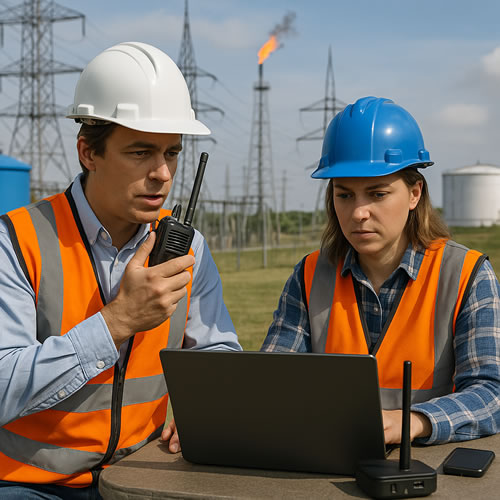
From rural water treatment plants to national grid infrastructure, the UK’s utilities sector is undergoing a major digital transformation and wireless telecommunications are at the heart of it. At Rapid Wireless, we provide resilient, secure and scalable wireless solutions that help utilities providers stay connected, compliant and in control. With the demand for smart grids, IoT sensors and automated control systems growing year on year, utilities providers need fast, secure and always-on connectivity, even in the most remote or hazardous environments. Why Wireless Matters in Utilities Wireless telecommunications are essential to modern utility operations. They enable real-time data collection and decision-making, allowing providers to monitor remote infrastructure, detect faults early and minimise response times. Wireless networks also improve operational efficiency by giving field engineers reliable mobile access to systems and live data. In the event of emergencies, outages, or environmental incidents, a resilient wireless system ensures continuity of service and faster recovery. As the sector moves toward smart grid systems and predictive maintenance, wireless connectivity forms the backbone of future-ready infrastructure. Our Wireless Telecom Solutions for Utilities We deliver tailored wireless infrastructure for key utility segments including electricity, gas, water and waste management. Our services include: Point-to-Point and Point-to-Multipoint Microwave Links: Ideal for linking distributed assets like substations, pumping stations, and treatment plants, especially in rural or hard-to-reach areas. Private 5G Networks: Dedicated wireless networks that support secure backhaul, field crew communications, and real-time monitoring without relying on public infrastructure. IoT-Ready Network Design: Our systems are built to support sensor-based technologies used for leak detection, asset tracking, condition monitoring and environmental compliance. Temporary Connectivity for Emergency Response or Maintenance Projects: Deployable wireless systems for planned outages, maintenance zones, or emergency scenarios. Resilient Comms for Control Centres and Field Engineers: Secure voice and data connectivity for operational teams, mobile field staff and unmanned assets. Let’s Connect Your Infrastructure Whether you’re upgrading your network, rolling out IoT sensors, or modernising your field communications, we’re here to help. At Rapid Wireless, we understand the demands of critical national infrastructure and we deliver wireless telecoms that meet them. Contact us today to discuss how we can support your next utility project with trusted wireless communication solutions.
Powering the Digital Classroom: How Wireless Telecoms Are Transforming UK Education

The landscape of education in the UK is changing fast. With blended learning models, connected classrooms and smart campuses becoming the norm, seamless wireless communication is now essential for effective teaching and learning. At Rapid Wireless, we specialise in delivering reliable, scalable and secure wireless telecom solutions to schools, colleges and universities across the country. The New Connectivity Standard in Education Modern education depends on connectivity – not just for students and staff, but also for the technologies that power a smart, secure and interactive learning environment. However, legacy networks and patchy coverage can hold institutions back. Key challenges include ensuring reliable coverage across large or historic campuses, supporting a growing number of connected devices and protecting networks from cyber threats, all while staying within public sector budgets. Our Solutions: Campus-Wide Wi-Fi and Wireless Backhaul: We design and deploy high-capacity Wi-Fi networks that ensure consistent access throughout classrooms, libraries, lecture halls and outdoor learning spaces. Point-to-Point and Point-to-Multipoint Microwave Links: Ideal for multi-site colleges or university estates, these links deliver fast and secure connections between buildings without the need for fibre trenching. Private 5G Networks: Custom wireless networks provide secure, high-performance connectivity for education authorities and institutions that require dedicated bandwidth and mobility. Temporary or Rapid Deployment Solutions: We offer fast deployment kits for temporary classrooms, exam centres, or overflow accommodation during term-time peaks. Secure Network Design and Integration: All our systems are built to meet UK education sector IT compliance standards, with robust cyber protection and device management capabilities. Cellular mobile signal boosting: Ideal for improving coverage in modern, signal-resistant school buildings and in schools located in rural or remote areas. Let’s Connect Education At Rapid Wireless, we believe that every learner deserves fast, secure access to digital resources and every educator needs the tools to deliver it. Whether you’re looking to upgrade your campus network or expand connectivity across multiple sites, we’re ready to help. Get in touch today to learn how our wireless telecoms solutions can help your institution achieve more.
Licensed vs Unlicensed Wireless Links: Which is Right for Your Business?

When selecting a wireless connectivity solution, businesses often have to make the decision between licensed and unlicensed wireless links. Both options offer distinct benefits and understanding their differences is key to choosing the right solution for your needs. In this blog post, we’ll explore the advantages and limitations of each to help you make an informed decision. What Are Licensed Wireless Links? Licensed wireless links are communication systems that operate within specific frequency bands regulated by governmental authorities. In the UK, these are typically managed by Ofcom (the UK’s communications regulator) to ensure minimal interference between users. Businesses that require licensed links must obtain a license and may be required to pay fees for their use of specific frequencies. Benefits of Licensed Wireless Links: 1. Guaranteed Spectrum Access: Licensed links provide exclusive access to specific frequency bands, ensuring minimal risk of interference from other users. 2. Higher Performance: With fewer users sharing the same frequencies, licensed links often deliver more reliable and stable performance, ideal for high-capacity needs. 3. Regulatory Compliance: Operating within the legal frequency bands ensures compliance with national regulations and avoids potential legal issues. Limitations of Licensed Wireless Links: 1. Cost: Licensing fees can make licensed links more expensive than unlicensed alternatives. 2. Longer Setup Time: Securing a license and installation may take longer due to regulatory processes. 3. Limited Flexibility: Once you’re assigned a frequency, it can be more challenging to change or move frequencies compared to unlicensed systems. What Are Unlicensed Wireless Links? Unlicensed wireless links, on the other hand, operate in frequency bands that are open for general public use without the need for a specific licence. Common unlicensed bands in the UK include the 2.4 GHz and 5 GHz bands, which are also used by Wi-Fi networks. Unlicensed systems are popular for businesses looking for cost-effective and quick-to-deploy connectivity. Benefits of Unlicensed Wireless Links: 1. Cost-Effective: There are no licensing fees, making unlicensed links a more affordable solution for many businesses. 2. Quick Deployment: With no regulatory delays, unlicensed links can be set up and operational in a much shorter time frame. 3. Flexibility: Unlicensed links can be more adaptable, allowing businesses to switch frequencies or adjust coverage as their needs change. Limitations of Unlicensed Wireless Links: 1. Higher Risk of Interference: Because the frequencies are open to anyone, other devices (such as Wi-Fi routers, microwaves, and other networks) can interfere with the signal, leading to performance degradation. 2. Lower Security: Since unlicensed frequencies are open to all, there may be increased security risks compared to licensed links. 3. Limited Bandwidth: Unlicensed bands, like 2.4 GHz and 5 GHz, have less capacity than licensed frequencies, which may limit the bandwidth and throughput available for high-demand applications. Which is Right for Your Business? The choice between licensed and unlicensed wireless links depends on your specific needs: For mission-critical, high-performance connectivity, a licensed link may be the best option. With guaranteed access to specific frequencies and reduced risk of interference, licensed links are ideal for businesses that require consistent and reliable performance, such as large enterprises or those with high-volume data traffic. For smaller businesses or those with flexible, cost-sensitive needs, an unlicensed link could be a great choice. It’s more affordable and quicker to deploy, making it suitable for companies that don’t need the same level of bandwidth or guaranteed performance. Choose the Right Wireless Link for Your Business At Rapid Wireless, we understand the importance of choosing the right wireless solution to fit your business needs. Whether you require the stability of a licensed link or the flexibility of an unlicensed one, we offer a range of point-to-point and point-to-multi-point wireless connectivity options that ensure fast, secure and scalable solutions. If you’re uncertain which option is best for your business, get in touch with our team for a free consultation. We’ll help you assess your requirements and guide you toward the best wireless solution.
Connecting Critical Services: How Wireless Telecoms Empower UK Transport & Public Safety
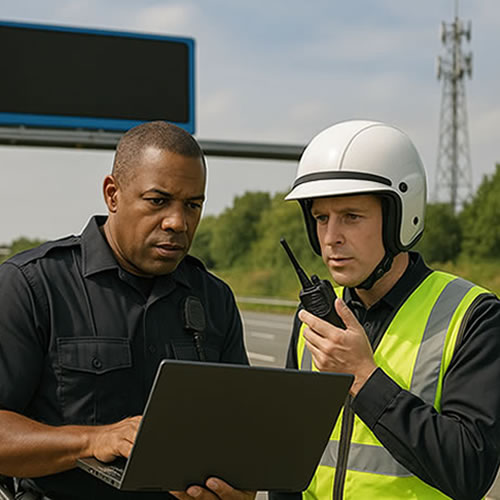
The modern transport and public safety sectors in the UK rely on seamless communication. Whether it’s monitoring the nation’s highways or ensuring rapid response for emergency services, connectivity underpins critical operations. At Rapid Wireless, we specialise in bespoke wireless telecommunications solutions that help transport authorities and public safety organisations stay connected, responsive and efficient. The Challenge of Connectivity in Transport & Public Safety From congested urban environments to remote rural roads, maintaining uninterrupted communication between control centres, vehicles and field personnel is complex. Traditional wired networks often fall short but this is where wireless telecom solutions step in. Key challenges include: One of the primary challenges is ensuring real-time data transfer across distributed assets, which is essential for responsive decision-making and system coordination. Networks must demonstrate resilience during adverse weather conditions or high traffic times, where system demands can spike unexpectedly. Providing dependable coverage in hard-to-reach or remote areas is also critical, particularly for roadside units or emergency response locations. Finally, there’s a growing need for the seamless integration of surveillance, signalling and communications systems, ensuring that all components of the infrastructure work together reliably and efficiently. Our Wireless Solutions for the Transport Sector We provide services and solutions that are designed to help highway authorities, road maintenance contractors, rail providers and urban transport bodies to deliver: These services ensure reliable communications between road-side units (RSUs), control rooms and enforcement equipment, supporting real-time traffic monitoring, congestion management and predictive maintenance. Public Safety Communication Solutions For blue light services and local authorities, communication failure is not an option. We help organisations such as, Police & fire services, Ambulance trusts, Local councils and Emergency resilience units by offering the following solutions: System Design, Integration & Ongoing Support Every project is different. That’s why we offer end-to-end services, including: With a focus on resilience, uptime and security, our wireless networks are tailored to comply with public sector IT and cybersecurity standards. Work With US Whether you’re modernising your transport infrastructure or upgrading emergency communication systems, our team is ready to help. Contact us today to learn more about how our wireless telecom solutions can future-proof your public safety or transport project.
Wireless solutions for Emergency services: Staying connected when it matters most
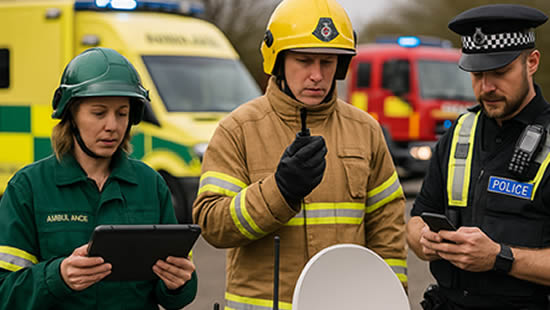
When an emergency strikes, every second counts and so does every word. For the UK’s emergency services communication is critical. Without reliable wireless systems, operations can grind to a halt, putting lives at risk. At Rapid Wireless, we help emergency service providers stay connected, coordinated and in control – no matter the challenge. Why Emergency Services need more than mobile networks Mobile phone networks are often the first thing to become overwhelmed during large-scale events or disasters. Signal blackouts, congested towers, and data slowdowns make mobile phones unreliable for frontline responders. That’s why emergency services rely on dedicated, secure wireless systems such as: These systems provide: Supporting field operations in real-time Emergency teams operate in complex, fast-changing environments. Wireless comms support instant coordination across teams and command centres, allowing for: This can mean faster decision-making and better outcomes for those in need. Our wireless expertise in critical situations At Rapid Wireless, we’ve supported everything from emergency network rollouts in response to natural disasters, to temporary communications for multi-agency exercises. We offer: In high-pressure situations, failure is not an option. Let us help you build a wireless system you can count on. Contact us today.
Bridging the Digital Divide: Enhancing Connectivity in Rural Areas
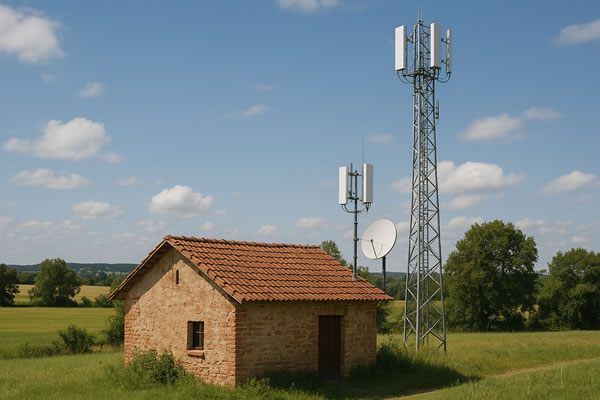
In a digital-first world, access to fast and reliable internet is as crucial as any other utility. However, for many rural areas across the UK, patchy or non-existent connectivity still presents a serious barrier to progress. At Rapid Wireless, we’re committed to helping bridge this digital divide – ensuring that no community or business is left behind due to their location. The Importance of Rural Connectivity For rural communities, poor connectivity doesn’t just mean slower streaming – it limits education, access to healthcare, business growth and social mobility. Farmers can’t fully utilise smart tech, remote workers struggle with basic video calls and local businesses are at a competitive disadvantage. Connectivity in rural areas is about more than convenience, it’s about economic resilience, social equality and future-proofing local communities. The Challenge: Infrastructure and Coverage Large telecoms providers often prioritise urban areas due to the higher population density and commercial return. This leaves rural communities stuck with outdated infrastructure, if any at all. What’s more, hilly terrain, forested landscapes and vast distances between users make traditional broadband rollouts slow and expensive. How wireless technology solves the problem Here’s where wireless telecoms come in. Solutions like point-to-point radio links, 4G/5G cellular backhaul and fixed wireless access (FWA) can provide high-speed broadband without the need for digging trenches or laying fibre. Wireless solutions are: Our Role in Rural Connectivity From rural broadband networks to temporary coverage at remote events or farms, Rapid Wireless provides bespoke wireless solutions designed to handle difficult terrains and limited infrastructure. We work directly with local authorities, landowners and businesses to identify the best approach – often combining multiple technologies for maximum coverage and reliability.
Why reliable two-way radios are essential for modern businesses
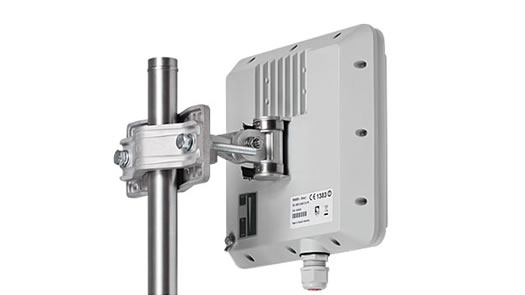
In today’s ultra-connected world, communication is everything. Whether you’re managing a construction site, organising a large-scale event, or coordinating a warehouse team, the way your team communicates can directly impact safety, efficiency and productivity. While smartphones are a staple in our personal lives, they simply don’t cut it when it comes to critical business communication. That’s where two-way radios shine and here’s why they’re still essential for modern businesses. Instant Communication Without the Hassle Unlike mobile phones, that rely on networks that can drop out or become congested, two-way radios offer instant, push-to-talk communication. There’s no need to unlock a device, scroll through contacts, or wait for a call to connect. With a single press of a button, you can speak directly to one person or a whole team. This speed of communication is crucial in time-sensitive industries such as: Built for business – Rugged, reliable and long-lasting Two-way radios are designed to perform in tough conditions. Dust, water, drops – they’re built to withstand it all. Many models are IP-rated and meet military standards for durability. That means they keep working no matter the environment. They also have long battery life, often lasting an entire shift on a single charge. That’s one less thing to worry about on a busy site. Cost-Effective and Scalable Unlike mobile phones, which require individual plans and data packages, two-way radios are a one-time investment with optional licensing depending on the frequency range. Whether you need 5 or 500 units, radio systems can easily scale with your needs. Hiring two-way radios for a short-term project or event is also a cost-effective way to improve team communication without permanent costs. Safety First In high-risk environments, safety is vital. Two-way radios support features like man-down alerts, emergency buttons, and GPS tracking, giving you peace of mind that your team is protected. At Rapid Wireless, we provide businesses with tailored two-way radio solutions, available to hire, purchase or service. Speak to us today, to see how we can help.
Navigating Telecom Licensing: What You Need to Know

Navigating telecom licensing can be a complex process, but it’s a crucial step for any business looking to deploy wireless networks, mobile services, or private communications solutions. Whether you’re expanding your operations or setting up a new telecom service, understanding licensing requirements ensures compliance with UK regulations and avoids costly delays. In this blog, we’ll break down the essentials of telecom licensing, why it matters for your business, and how having the right equipment – without supply chain delays- can make all the difference. Understanding Telecom Licensing In the UK, telecom licences are regulated by Ofcom, ensuring fair use of the radio spectrum and preventing interference between networks. Depending on your needs, you may require a specific licence for mobile services, fixed wireless access, or private networks. Securing the right licence is essential for operating legally and maintaining seamless connectivity. Why Licensing Affects Your Equipment Choices Having the correct licence is only one part of the equation – ensuring you have the right equipment is just as critical. Many businesses secure licences only to have delays due to supply chain shortages when sourcing essential telecom hardware. We Have Stock When Others Don’t While other suppliers struggle with stock shortages, we ensure that our customers have access to the telecom equipment they need, when they need it. Whether you’re setting up a private network, deploying 5G solutions, or upgrading infrastructure, we have a ready supply of:✔ Base stations and antennas✔ Network routers and switches✔ SIM cards and mobile connectivity solutions✔ Private network hardware By working with us, you can secure your telecom licence with confidence, knowing that supply chain issues won’t hold you back. Stay Ahead with Reliable Stock and Expert Support Navigating telecom licensing can be challenging, but having the right partner makes all the difference. At Rapid Wireless, we not only provide expert guidance on network deployment, but we also ensure you have immediate access to high-quality telecom equipment. Don’t let supply shortages slow you down. Get in touch with us today to discuss your licensing and hardware needs – we’re here to keep you connected.
What Happens During a Radio Site Decommissioning Project?
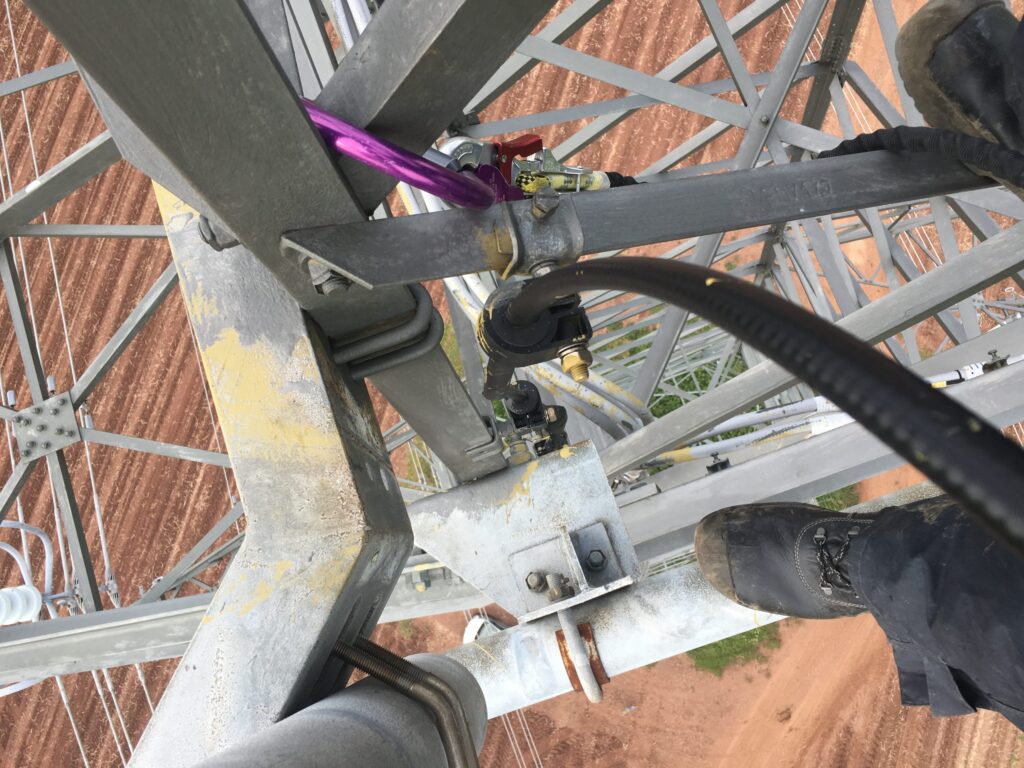
As technology evolves and networks are upgraded, older radio sites sometimes need to be decommissioned. Whether due to 5G rollouts, network consolidation, or infrastructure upgrades, decommissioning a radio site is a complex but necessary process. So, what exactly happens during a radio site decommissioning project? 1. Planning and Site Assessment Before any physical work begins, a thorough site assessment is conducted. This involves identifying equipment to be removed, evaluating potential risks and ensuring compliance with regulatory and environmental guidelines. A detailed decommissioning plan is created to minimise disruption and ensure a smooth transition. 2. Equipment Deactivation and Network Migration The next step is safely deactivating the radio equipment. To avoid service interruptions, alternative network solutions may be put in place, such as rerouting signals through nearby towers or upgrading other sites. This ensures continued connectivity for users. 3. Dismantling and Equipment Removal Once the site is offline, the physical dismantling process begins. Antennas, transmitters, cables and other telecom equipment are carefully removed. If possible, some components may be repurposed or recycled, reducing waste and lowering costs. 4. Site Restoration and Compliance Checks After all equipment is removed, the site is restored to its original state, whether that means dismantling the tower, removing foundations, or simply clearing the area. Final inspections are conducted to ensure compliance with safety and environmental regulations. 5. Data Management and Reporting Proper documentation is crucial during decommissioning. Reports detailing the removal process, inventory of dismantled equipment and any environmental considerations are compiled. This ensures transparency and compliance with industry standards. How We Can Help At Rapid Wireless, we specialise in managing radio site decommissioning projects efficiently and with minimal disruption. Our experienced team ensures that every step, from planning to site restoration, is handled professionally and in full compliance with industry regulations. If you need support with radio site decommissioning, get in touch with us today. We’ll ensure a smooth, hassle-free process while keeping your network running seamlessly.
